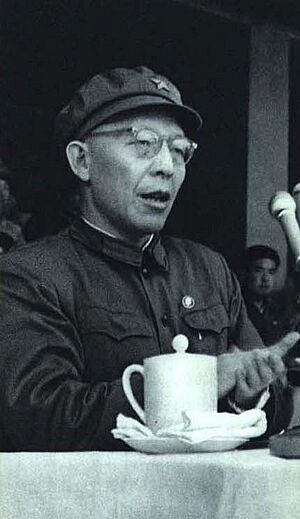Zhang Chunqiao facts for kids
Quick facts for kids
Zhang Chunqiao
|
|
|---|---|
 |
|
| Vice Premier of China | |
| In office January 1975 – July 1977 |
|
| Premier | Zhou Enlai Hua Guofeng |
| Leader | Mao Zedong |
| Director of the Shanghai Revolutionary Committee | |
| In office February 1967 – July 1977 |
|
| Preceded by | Cao Diqiu (as mayor) |
| Succeeded by | Su Zhenhua |
| Personal details | |
| Born | 1 February 1917 Heze, Shandong, Republic of China |
| Died | 21 April 2005 (aged 88) Beijing, China |
| Political party | Chinese Communist Party (1938–1977; expelled) |
| Zhang Chunqiao | |||||||||||
|---|---|---|---|---|---|---|---|---|---|---|---|
| Simplified Chinese | 张春桥 | ||||||||||
| Traditional Chinese | 張春橋 | ||||||||||
|
|||||||||||
Zhang Chunqiao (Chinese: 张春桥; 1 February 1917 – 21 April 2005) was an important Chinese writer and politician. He became well-known during the later part of the Cultural Revolution. He was also a member of a group called the "Gang of Four". This group strongly supported Mao Zedong's ideas.
Zhang joined the Chinese Communist Party in 1938. Later, he became a leading journalist for the Jiefang Daily newspaper. This was after the People's Republic of China was formed. He gained attention in 1958 for an article he wrote. Mao Zedong liked it so much that he had it printed in another major newspaper, People's Daily.
During the Cultural Revolution, Zhang became a key figure. He helped lead the Shanghai People's Commune in 1967. This group took control of the local government in Shanghai. He then became the head of the Shanghai Revolutionary Committee. Zhang joined the top political groups in China, the Politburo in 1969 and its Standing Committee in 1973. By 1975, he was the second-highest-ranking vice premier in the country.
After Mao Zedong passed away in 1976, Zhang was arrested. He was arrested along with the other members of the "Gang of Four". He was later imprisoned and passed away in 2005.
Early Life and Career
Zhang Chunqiao was born in Juye County, Shandong province. In the 1930s, he worked as a writer in Shanghai. He made many important connections in the city. In 1938, he joined the Chinese Communist Party.
After the proclamation of the People's Republic of China, Zhang became a leading journalist in Shanghai. He was put in charge of the Jiefang Daily newspaper. Here, he met Jiang Qing, who would later become Mao Zedong's wife.
Zhang first became widely known in 1958. This was because of his article "Destroy the Ideology of Bourgeois Right". Mao Zedong noticed the article and ordered it to be reprinted. Mao even added a note showing his approval. Zhang was seen as a strong supporter of Mao. Mao was then in a political struggle with another leader, Liu Shaoqi.
Role in the Cultural Revolution
During the Cultural Revolution, Zhang traveled often between Beijing and Shanghai. In November 1966, he went to Shanghai to represent the Cultural Revolution Group. He helped organize the Shanghai People's Commune in February 1967. He worked with Wang Hongwen and Yao Wenyuan to do this. This group took over the city government and local party. Zhang became the chairman of the city's Revolutionary Committee. This role was like being both the mayor and the party leader.
In April 1969, Zhang joined the Politburo. This is a very important group in the Communist Party. In 1973, he was promoted to the Standing Committee. This is an even smaller, more powerful group. In January 1975, Zhang became the second-ranked Vice Premier. He wrote an important article to promote the study of the "dictatorship of the proletariat."
Arrest and Later Life
Zhang was arrested in October 1976. This happened along with the other members of the "Gang of Four." This arrest was part of a plan by other leaders like Ye Jianying, Li Xiannian, and Hua Guofeng. He was removed from the Communist Party in July 1977.
Zhang was later imprisoned. In 1998, he was released from prison for medical reasons. He lived quietly in Shanghai until he passed away in April 2005.
Reading List
- Zhang Chunqiao Reference Archive
- "On Exercising All-Round Dictatorship over the Bourgeoisie"
| Political offices | ||
|---|---|---|
| Preceded by Cao Diqiu as Mayor of Shanghai |
Chairman of the Revolutionary Committee of Shanghai 1967–1976 |
Succeeded by Su Zhenhua |
| Preceded by Deng Xiaoping |
First-ranking Vice Premier of China 1976 |
Succeeded by Li Xiannian |
| Party political offices | ||
| Preceded by Chen Pixian Vacant since 1967 |
Secretary of the CPC Shanghai Committee 1971–1976 |
Succeeded by Su Zhenhua |
| Military offices | ||
| Preceded by Li Desheng Vacant since 1970 |
Director of the General Political Department of the People's Liberation Army 1975–1976 |
Succeeded by Wei Guoqing Vacant until 1977 |
 | George Robert Carruthers |
 | Patricia Bath |
 | Jan Ernst Matzeliger |
 | Alexander Miles |

